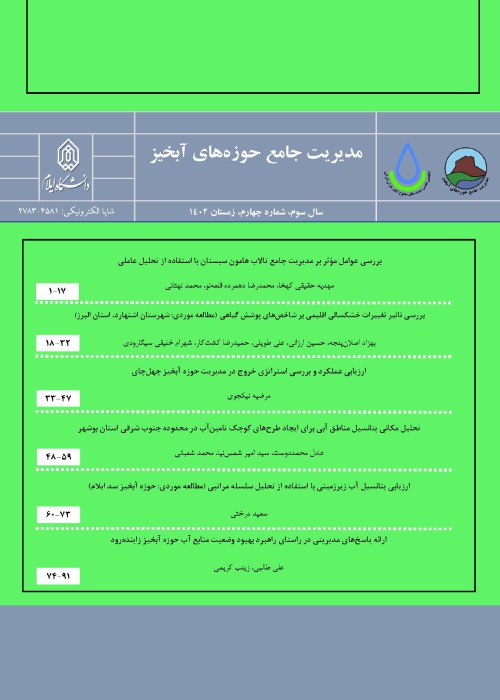Analyzing dimensions of integrity in the Concept of Integrated Watershed Management in Iran
Nowadays, the approach of integrated watershed management (IWM) has been widely accepted as a reference and reliable model by scientific experts, executive managers, policymakers, and planners in the country. From the perspective of many experts and professionals in natural resources and environment, the land area of Iran is surrounded by a range of natural, climatic, and social hazards related to watershed areas. In conditions where each of these hazards alone can lead to environmental, economic, and social crises, a critical analysis of IWM as the most accepted management unit in nature is essential. Despite the importance of this reference model for planning and organizing watershed areas, this approach is often subject to personal preferences due to the lack of a comprehensive and widely accepted definition at the macro level, which results in managers and planners not being responsive. Moreover, watershed management plans and comprehensive management of watershed areas in Iran face various challenges and have not been successful despite the allocation of considerable resources. Therefore, it is necessary to address the ambiguities and challenges of the integrated management approach in order to achieve a coherent and comprehensive management in watershed areas. In this regard, the present study focuses on a critical analysis of the hidden challenges in the approach of IWM and provides policy recommendations and practical suggestions for IWM in Iran.
In this study, two tasks were performed to examine and explain the comprehensiveness dimensions. In the first stage, resources related to studies on natural resources and watershed management in the country were reviewed. In this stage, the targeted resources were examined using the term "integrated" and the words, terms, and concepts associated with this term. The result of this review was the determination and identification of six keywords and concepts related to the term "integrated". In the next stage, these six factors and keywords were used as six diagnostic and identification codes for examining watershed management plans and IWM. The focus was on determining the presence or absence of these keywords and terms in the implemented watershed management plans. The objective was to determine whether these six key words and theoretical concepts identified in the first stage have been employed in the practical implementation of the IWM plans. This was accomplished through content analysis of implemented watershed management plans in various regions of the country. In each of the implemented plans, the type and extent of utilization, or, in other words, the level of attention given to the mentioned six factors, were examined and analyzed.
In this study, corresponding to the six dimensions of comprehensiveness in the concept of IWM in Iran, six policy recommendations and implementation proposals have been presented. These policy recommendations and implementation proposals encompass a combination of environmental, economic, social, and cultural factors, as gaps in these factors will hinder the integrated management of elements. This research suggests that the executive responsibility for integrated management should be entrusted to the Natural Resources and Watershed Management Organization of the country in coordination with other relevant organizations. This organization, if legal barriers are removed and policy-making streams are aligned, will be able to fulfill its main intrinsic duty, which is the management of the country's watersheds. Regarding the components of ecosystem stakeholders, this study emphasizes that the stakeholders should include all ecosystem stakeholders since any form of anthropocentrism jeopardizes the sustainability of ecosystems. In terms of the dimension of interconnectedness of natural boundaries, the results of this study emphasize the importance of interconnectedness in terms of perspectives, planning, and policy-making. In other words, political boundaries at the county, provincial, and international levels pose increasing challenges to IWM. Therefore, the basis for planning should be the natural boundaries of watersheds. Hence, bridging the gaps and achieving interconnectedness in terms of intra-county and intra-provincial boundaries can be achieved through organizational coherence and defining the responsibilities of organizations based on the natural boundaries of watersheds. As for international boundaries, it requires strengthening diplomacy and reaching regional agreements and treaties. Regarding the elements that should be considered in the comprehensive management approach by planners and executive managers, it can be stated that these elements should include all the components present in ecosystems, including water, soil, and vegetation cover.
The findings of this study indicate the possibility of employing integrated, cohesive, and coordinated management in the natural environments of Iran as a suitable, precise, scientific, and systematic guideline. The recommendations and proposals of this research can lead to interconnectedness, comprehensive perspectives, organizational coherence, coordination among decision-making bodies, enhancement of policy and legal effectiveness, community satisfaction, alignment of activities between planners and watershed residents, and ultimately, improvement in social responsibility and widespread participation of stakeholders in watershed management. Implementing the recommendations provided in this study in future plans and projects can contribute to improving the environmental conditions of watershed inhabitants and ensuring the sustainability of natural ecosystems by addressing the existing challenges.
- حق عضویت دریافتی صرف حمایت از نشریات عضو و نگهداری، تکمیل و توسعه مگیران میشود.
- پرداخت حق اشتراک و دانلود مقالات اجازه بازنشر آن در سایر رسانههای چاپی و دیجیتال را به کاربر نمیدهد.



